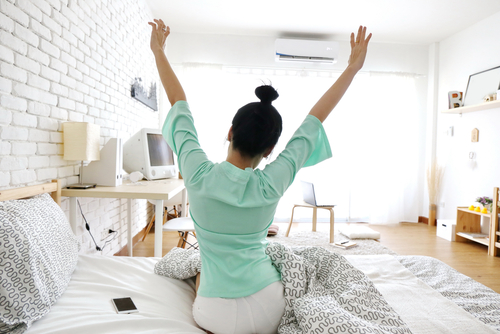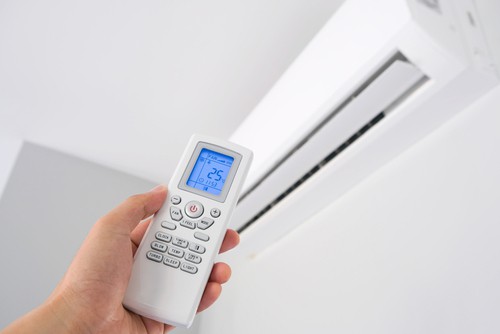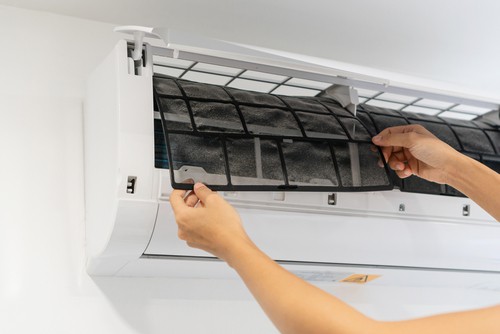
The Link Between Air Conditioning Usage and Sleep Quality. Sleep is not just a period of rest, but a critical component of our health and well-being, intricately linked to our physical, mental, and emotional health.
In the relentless humidity and heat of Singapore, air conditioning (AC) has become a ubiquitous feature of our lives, not just a means to comfort but a necessity for many.
This article explores the delicate balance between using air conditioning to improve sleep quality and ensuring it does not detrimentally affect our health or contribute excessively to energy consumption.
The quest for a good night’s sleep is universal. In the context of Singapore’s tropical climate, where temperatures seldom dip below 25°C even at night, maintaining a cool environment indoors has become indispensable.
While air conditioning can be a blessing for many, ensuring the quality of sleep is not compromised by improper use is essential.
This discussion delves into how air conditioning impacts sleep quality and provides insights into optimizing its use for a restful night.
The Science of Sleep and Comfort

Understanding Sleep Cycles
Sleep unfolds in cycles that alternate between REM (Rapid Eye Movement) sleep and non-REM sleep, each playing a crucial role in health and restoration.
The quality of these cycles can be influenced significantly by environmental conditions, with disturbances in temperature, noise, or light potentially fragmenting sleep and detracting from its restorative effects.
Ideal Conditions for Optimal Sleep
The consensus among sleep scientists is that the optimal bedroom environment is cool, quiet, and dark.
Specifically, temperatures around 18-22°C are considered ideal for sleep.
This is where air conditioning comes into play, offering a controlled solution to maintain these conditions, especially in climates where night-time temperatures and humidity levels make natural cooling insufficient.
How Air Conditioning Affects Sleep
Temperature Regulation and Sleep Quality
A consistent, cool temperature is pivotal for deep, restorative sleep.
Air conditioning can help maintain this optimal sleep environment by counteracting Singapore’s pervasive warmth.
However, it’s crucial to set your AC to a comfortable temperature that supports your body’s natural cooling process as you sleep.
Potential Negative Effects of Air Conditioning on Sleep
While beneficial, reliance on air conditioning is not without its drawbacks. The noise from older or poorly maintained units can disrupt sleep.
Furthermore, air conditioners that excessively dry the indoor air can lead to dehydration or irritate the respiratory system, impacting sleep quality and overall health.
Balancing Comfort and Health
Consider the following tips:
- Use AC units with low noise levels or soundproof your bedroom to minimize disruption.
- Set your AC to maintain a temperature conducive to sleep, ideally between 18-22°C.
- Utilize a humidifier if you find the air becomes too dry, ensuring your respiratory system remains hydrated.
Enhancing Sleep Quality with Air Conditioning

Choosing the Right Air Conditioning System
When selecting an air conditioning system, prioritize units that offer quiet operation, efficient temperature control, and air filtration features to enhance air quality.
Modern systems with smart controls can offer programmable settings that adjust temperatures throughout the night to match your sleep cycle.
Optimizing Air Conditioner Settings for Sleep
To promote restful sleep:
- Set your AC to gradually increase the room temperature throughout the night, aligning with your body’s natural temperature cycle.
- Use programmable thermostats or smart home systems to automate temperature adjustments, ensuring uninterrupted sleep.
Improving Air Quality and Humidity
Maintain good air quality in your bedroom by:
- Regularly cleaning or replacing AC filters to remove dust and allergens.
- Pairing your AC with a humidifier or dehumidifier to keep humidity levels in a comfortable range, supporting respiratory health.
Alternative Cooling Strategies for Better Sleep
Natural Ventilation and Cooling Techniques
On cooler nights, or during transitional periods like the monsoon season, consider leveraging natural ventilation.
Opening windows to create cross-ventilation can significantly improve indoor air quality and reduce reliance on air conditioning.
The Use of Fans for Sleep Comfort
Fans can be an effective supplement or alternative to air conditioning, offering a gentle, quiet airflow that enhances comfort without significantly lowering air humidity.
Lifestyle and Environmental Adjustments
Optimizing your bedroom environment also involves:
- Choosing breathable, natural-fiber bedding that supports temperature regulation.
- Minimizing heat sources by limiting the use of electronics in the bedroom before sleep.
Frequently Asked Questions

How does the air conditioner’s fan speed affect sleep quality?
Adjusting the fan speed on your air conditioner can impact both comfort and noise levels during sleep.
A lower fan speed might reduce noise, contributing to a more peaceful sleep environment, but it may not circulate air as effectively in larger rooms.
Finding a balance between efficient air circulation and minimal noise can help improve sleep quality.
Is it more energy-efficient to leave the air conditioner on all night or use it intermittently?
It can be more energy-efficient to use the air conditioner intermittently, particularly if you can maintain a comfortable temperature by cooling the room before bedtime and then using alternative methods, like fans, to keep cool throughout the night.
However, this depends on various factors, including the outside temperature and the efficiency of the air conditioning unit.
Programmable thermostats can automate this process to optimize energy use and comfort.
Can sleeping in an air-conditioned room worsen allergies?
Sleeping in an air-conditioned room can actually benefit allergy sufferers by reducing exposure to outdoor allergens like pollen.
However, if the AC unit is not regularly cleaned and maintained, it can circulate indoor allergens and dust, potentially worsening allergies.
Regular cleaning of filters and ensuring the system is well-maintained can mitigate this risk.
How often should the air conditioning unit be serviced to ensure optimal sleep quality?
Generally, it is recommended to have your air conditioning unit serviced at least once a year to ensure it operates efficiently and maintains air quality.
Regular servicing can prevent issues that may impact sleep quality, such as noise from a malfunctioning unit or poor air quality due to dirty filters.
What are the signs that my air conditioner is too powerful or not powerful enough for my bedroom?
If your air conditioner cools the room too quickly without adequately dehumidifying the air, it may be too powerful for the space, leading to a cold, damp environment that can disrupt sleep.
Conversely, if the unit struggles to cool the room to a comfortable temperature or takes a long time to achieve the desired temperature, it might not be powerful enough.
Both scenarios can affect sleep quality and indicate that a different size or type of air conditioner may be more suitable for your needs.
The Link Between Air Conditioning Usage and Sleep Quality – Conclusion

Air conditioning, when used thoughtfully, can significantly enhance sleep quality in Singapore’s climate.
By understanding and optimizing the interplay between air conditioning and sleep, individuals can enjoy restful nights that contribute to overall well-being.
Balancing the benefits of modern air conditioning with mindful usage and maintenance ensures that this essential comfort does not come at the expense of health or the environment.
Are you seeking a professional and reliable aircon servicing company in Singapore? Contact us today!
